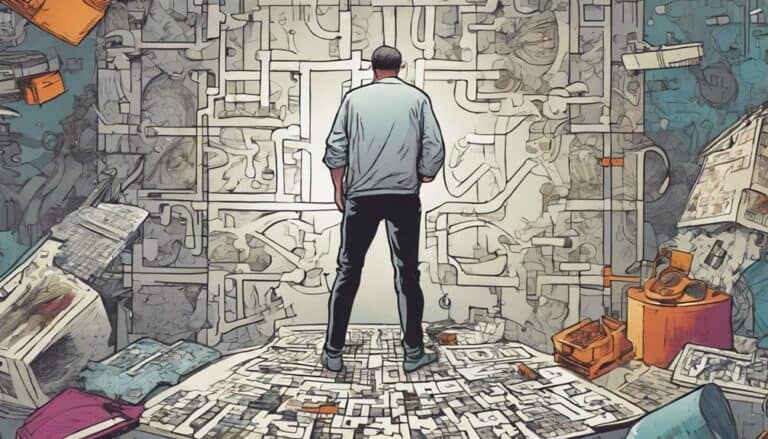In effective problem-solving, critical thinking components like analyzing information, questioning assumptions, and evaluating logical reasoning are essential. Formulating probing questions, defining problems clearly, and identifying assumptions and biases are key steps. Enhancing problem-solving skills through metacognition, fostering self-awareness, and constructing logical arguments all contribute to better judgments. By focusing on valid reasoning, evaluating evidence, and considering alternative viewpoints, you can improve your problem-solving abilities greatly. These key components are fundamental to mastering critical thinking for effective problem-solving. You'll find valuable insights to enhance your problem-solving skills further.
Key Takeaways
- Formulating probing questions helps uncover underlying issues and explore various perspectives.
- Recognizing assumptions and biases aids in making objective and rational decisions.
- Metacognition fosters reflective thinking for self-awareness and improving problem-solving techniques.
- Constructing logical arguments involves evaluating evidence and considering alternative viewpoints.
- Analyzing information, questioning assumptions, and evaluating logical reasoning enhance decision-making abilities.
Importance of Critical Thinking in Problem-Solving
Analytical problem-solvers recognize the paramount importance of critical thinking in maneuvering complex challenges effectively. Critical thinking skills are essential for problem-solving as they involve analyzing information, questioning assumptions, and evaluating logical reasoning to arrive at sound solutions. By honing these skills, individuals can enhance their decision-making abilities and approach problems with a logical mindset. Critical thinking enables one to identify biases, recognize patterns, and consider multiple perspectives when tackling intricate issues. This process aids in developing a deeper understanding of the problem at hand and devising innovative solutions.
Moreover, critical thinking plays a vital role in navigating through uncertainties, as it allows individuals to assess evidence accurately and draw valid conclusions. By questioning assumptions and scrutinizing information carefully, analytical problem-solvers can avoid common pitfalls and arrive at more effective solutions. Therefore, cultivating strong critical thinking skills is paramount for individuals seeking to excel in problem-solving and decision-making tasks.
Probing Questions and Problem Definition
Initiate the problem-solving process by formulating probing questions that investigate into the heart of the issue and define it clearly to pave the way for effective analysis and resolution.
Probing questions are insightful inquiries that help challenge assumptions, uncover underlying issues, explore different perspectives, and identify potential solutions. By delving deep into the problem through these questions, you can gain a thorough understanding of the situation at hand.
When defining problems, it's pivotal to break down complex issues into manageable parts for systematic analysis. Clarity in problem definition is vital as it aids in focusing your efforts, setting clear objectives, and developing strategies to address challenges effectively.
Identifying Assumptions and Biases
Recognizing assumptions and biases is a fundamental step in the process of cultivating critical thinking skills essential for effective problem-solving.
When identifying assumptions, you're acknowledging beliefs that are often taken for granted without sufficient evidence or proof.
Recognizing biases involves understanding personal inclinations or prejudices that may influence your judgment.
By challenging assumptions and recognizing biases, you can make more objective and rational decisions, ultimately enhancing the quality of your problem-solving processes.
This practice of addressing assumptions and biases is integral to critical thinking as it leads to more accurate and effective solutions.
It allows you to approach problems with a clearer mind and make decisions based on objective judgment rather than subjective influences.
Metacognition for Reflective Thinking
Engaging in metacognition enhances problem-solving skills by fostering self-awareness and reflection on cognitive processes and strategies. Metacognition involves thinking about one's own thinking, enabling individuals to reflect on their cognitive abilities, understanding, and problem-solving approaches. This reflective thinking helps in recognizing biases, assumptions, and errors in reasoning, leading to improved decision-making. By fostering self-awareness and self-regulation, metacognition enhances critical thinking skills, allowing individuals to evaluate and improve their problem-solving techniques effectively.
| Metacognition | Reflective Thinking |
|---|---|
| Self-awareness | Recognizing biases |
| Self-regulation | Identifying assumptions |
| Improved problem-solving | Evaluating techniques |
Through metacognition, individuals can gain a deeper understanding of their own cognitive processes, which in turn allows them to reflect on and improve their problem-solving strategies. By actively engaging in reflective thinking, one can identify and overcome biases, assumptions, and errors in reasoning, leading to more effective and efficient problem-solving outcomes.
Constructing Logical Arguments and Judgments
By honing your ability to construct logical arguments and make informed judgments, you enhance your problem-solving skills through evidence-based reasoning and critical analysis. Constructing logical arguments involves forming valid reasoning, identifying assumptions, evaluating evidence, and drawing conclusions based on logical connections.
When making judgments in critical thinking, it's essential to weigh evidence, consider alternative viewpoints, and avoid fallacies that could distort your reasoning process. By mastering the art of constructing logical arguments, you'll be better equipped to present your ideas persuasively and defend your positions effectively.
This skill not only aids in effective problem-solving but also contributes to your overall ability to think critically and analyze situations with a rational mindset. Remember, the process of constructing logical arguments is a pivotal aspect of critical thinking that underpins your ability to navigate complex issues and reach well-founded decisions.
Conclusion
To summarize, mastering the components of critical thinking is essential for effective problem-solving. By asking probing questions, challenging assumptions, and engaging in reflective thinking, one can construct logical arguments and judgments.
As the old saying goes, 'A stitch in time saves nine.' Embracing critical thinking skills won't only help you navigate complex problems, but also lead to more informed and successful decision-making.
Remember, the key to solving any problem lies in your ability to think critically.

